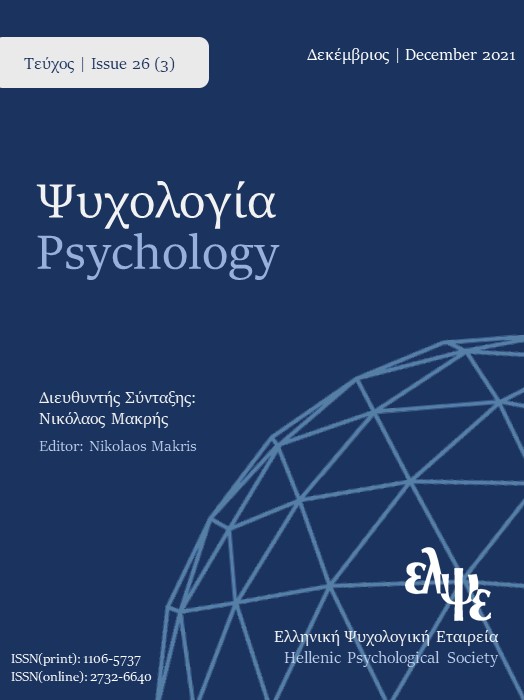Στρατηγικές αντιμετώπισης αντίξοων καταστάσεων, αντιλαμβανόμενο αίσθημα απειλής και πηγές κοινωνικής υποστήριξης σε ενηλίκους κατά την περίοδο της πανδημίας COVID-19

Περίληψη
Λεπτομέρειες άρθρου
- Πώς να δημιουργήσετε Αναφορές
-
Αντωνίου Α. Σ., Greenglass, E., Δημόπουλος Μ. Α., Χρούσος Γ., Παπαγεωργίου Χ., & Τούντας Γ. (2022). Στρατηγικές αντιμετώπισης αντίξοων καταστάσεων, αντιλαμβανόμενο αίσθημα απειλής και πηγές κοινωνικής υποστήριξης σε ενηλίκους κατά την περίοδο της πανδημίας COVID-19. Ψυχολογία: το περιοδικό της Ελληνικής Ψυχολογικής Εταιρείας, 26(3), 165–180. https://doi.org/10.12681/psy_hps.28912
- Ενότητα
- ΕΙΔΙΚΟ ΑΦΙΕΡΩΜΑ

Αυτή η εργασία είναι αδειοδοτημένη υπό το Creative Commons Attribution-ShareAlike 4.0 International License.
Το περιοδικό ΨΥΧΟΛΟΓΙΑ έχει υιοθετήσει μία πολιτική Platinum open-access. Τα έξοδα υποβολής, επεξεργασίας ή δημοσίευσης των εργασιών καλύπτονται από την Ελληνική Ψυχολογική Εταιρεία. Τα πνευματικά δικαιώματα των δημοσιευμένων εργασιών προστατεύονται από την άδεια 'Creative Commons Attribution-ShareAlike 4.0 International'. Οι Συγγραφείς διατηρούν τα Πνευματικά Δικαιώματα και χορηγούν στο περιοδικό το δικαίωμα της πρώτης δημοσίευσης. Η άδεια αυτή επιτρέπει σε τρίτους, να χρησιμοποιούν την εργασία σε οποιαδήποτε μορφή, με την προϋπόθεση της διατήρησης των διατυπώσεων που προβλέπονται στην άδεια σχετικά με την αναφορά στον αρχικό δημιουργό και την αρχική δημοσίευση στο περιοδικό ΨΥΧΟΛΟΓΙΑ. Επιπλέον, κάθε διανομή της εργασίας οφείλει να γίνεται με τους ίδιους όρους διανομής, δηλαδή με την ίδια άδεια Creative Commons.


